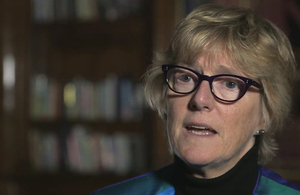Chief Medical Officer calls for action on women’s health
Report by Professor Dame Sally Davies targets obesity and ovarian cancer and encourages women to talk about 'taboos' such as incontinence.

CMO Sally Davies
In her latest annual report, ‘Health of the 51%: women’, the Chief Medical Officer (CMO) Professor Dame Sally Davies makes recommendations on a wide range of health issues, most notably obesity, ovarian cancer and ‘taboo problems’ such as incontinence and the menopause.
Obesity
The report highlights obesity as one of the biggest risks to women’s health, affecting all aspects of a woman’s life from birth, family planning, pregnancy and right through to menopause and later life.
In England, 56% of women aged 35 to 44 and 62% of women aged 45 to 54 were classified as overweight or obese in 2013. Dame Sally says that the growing obesity problem is so serious that the government needs to make tackling obesity in the whole population a national priority.
She said:
Action is required across all of society to prevent obesity and its associated problems from shortening women’s lives and affecting their quality of life. We need to address the educational and environmental factors that cause obesity and empower women and their families to live healthier lives.
As obese women have an increased chance of miscarriage and premature birth, the report highlights planning for pregnancy as an important missed opportunity to give women health messages to improve their mental and physical health and that of their children.
Dame Sally wants to end the myth that women should eat for 2 when pregnant. She has asked all women to work with healthcare professionals to make positive changes when planning to get pregnant and to stay healthy throughout their pregnancy.
She said:
In women, obesity can affect the outcomes of any pregnancies they have and the health of any future children they may have.
This is a difficult message to convey, as it risks burdening women with guilt and responsibility, but I believe that it can also empower women to take positive steps like eating more healthily and taking more exercise. It is never too late to take action for a healthier lifestyle – for you and your family.
Taboo problems
The report encourages women not to suffer in silence about some of the problems they find embarrassing to talk about, such as incontinence or the menopause.
Urinary and faecal incontinence affects more than 5 million women in the UK and, along with prolapse, costs the NHS more than £200 million a year in treatment and support. Six weeks after pregnancy, 33% of women report urinary incontinence and 10% report faecal incontinence.
Dame Sally said:
We need to challenge taboos around the menopause and incontinence to make sure embarrassment is never a barrier to better health.
Problems ‘below the waist’ are not generally seen as attractive topics for public discussion, and women are often reluctant to seek help for common disabling conditions. This needs to end – women should never suffer in silence. Breaking the taboo around these subjects will help more women come forward and get the care they need.
Ovarian cancer
The CMO’s report also examines women’s cancers, particularly ovarian cancer. This is the second most common gynaecological cancer and the most lethal, with 6,483 women in England diagnosed with ovarian cancer in 2012 and 3,988 deaths in 2013. Survival in England and the UK is among the lowest in the OECD nations, with 5-year survival rates around 36%.
The report calls for a national audit of ovarian cancer to improve outcomes for the disease. It also highlights the benefits of better surgery - often meaning longer operating times - for ovarian cancer. Operating times of over 3 hours are more successful in removing the cancer cells compared to operating times of less than 3 hours.
Dame Sally said:
Deaths from ovarian cancer are still stubbornly high - a national audit of ovarian cancer is surely long overdue given the numbers of deaths we are seeing from this silent killer. We have seen such audits improve outcomes for lung, bowel, head and neck cancers and I want to see the same happen for ovarian cancer.
Other recommendations
In a wide ranging report, the Chief Medical Officer also recommends:
- all clinical staff be better trained to recognise and respond to violence against women
- more research to improve maternal and child mental and physical health
- more research on screening tests, preeclampsia and fetal growth
- clinical commissioning groups should ensure prompt access to evidence-based enhanced cognitive behaviour therapy (CBT-E) and family based therapy for people with eating disorders
- children should receive integrated personal, social, health and economic education, with sex and relationships education a routine, if necessary statutory, part of their education
- a full range of contraception services should be available to all women, at all reproductive ages
- the Royal College of Obstetricians and Gynaecologists should make sure that sub-specialist training in gynaecological oncology equips doctors to perform optimal surgery for gynaecological cancers and reduce mortality from ovarian cancer
- managers should make it easier for women to discuss the menopause in the workplace, without embarrassment, which could lead to reduced sick leave and improved employee health.